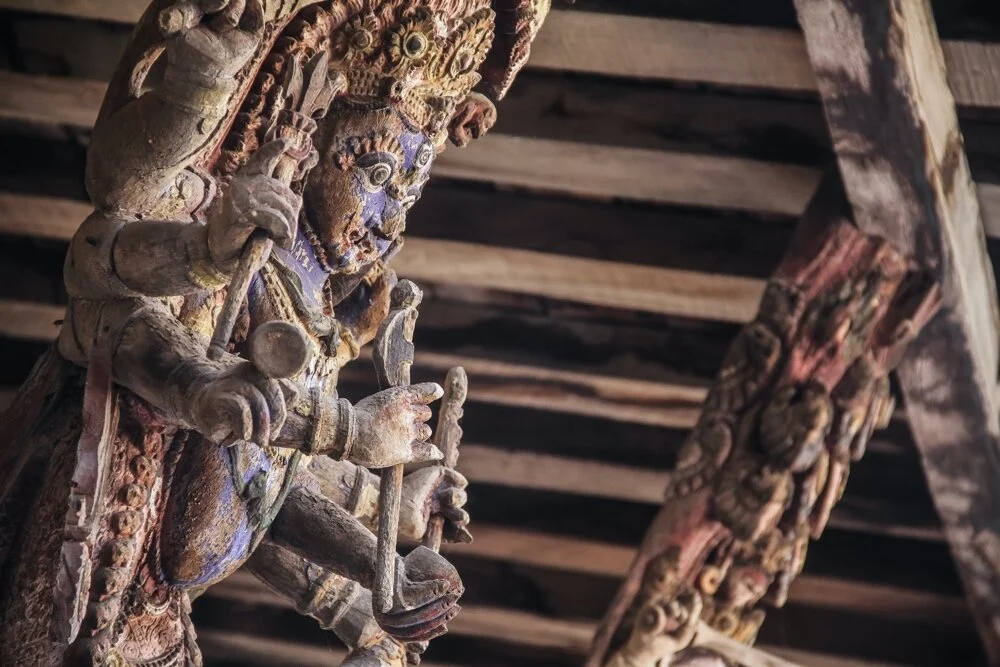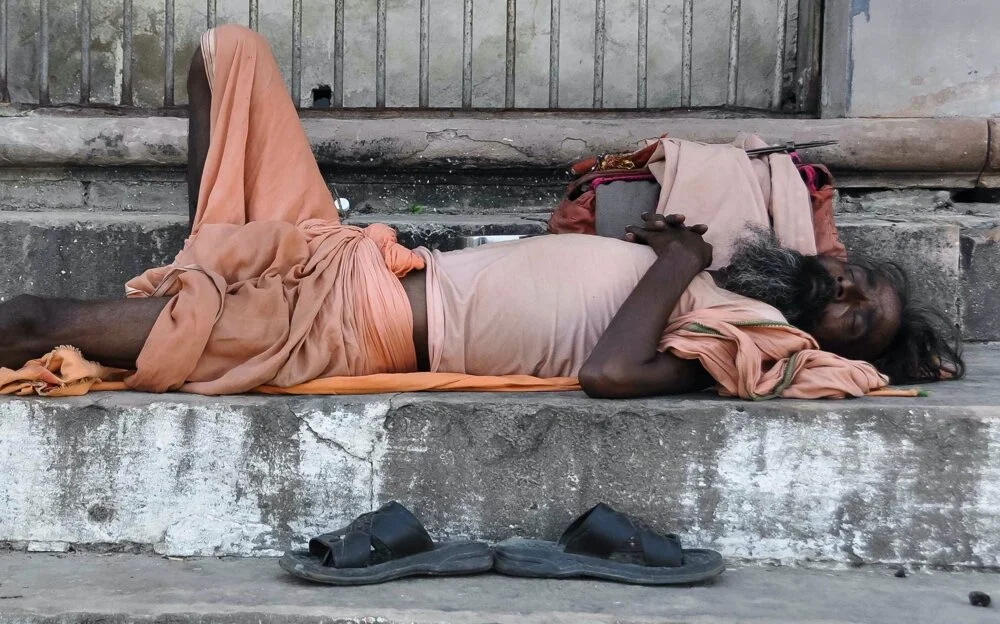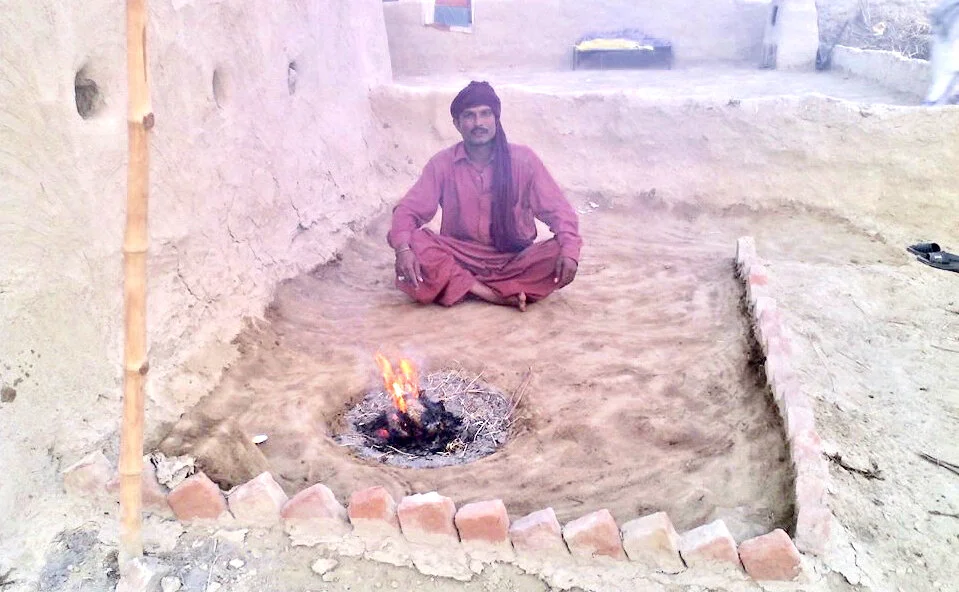One of my favorite restaurants is Or2k, a bohemian Israeli place in Kathmandu, Nepal. They serve middle-eastern vegetarian and play Marley, and Dylan, and Cat Stevens. The walls are decorated with blacklight mushrooms and Kokopelli—a sort of eclectic, retro-hippie, groove—très chic. It’s usually full of stoners, and backpackers, and young singles making travel diary entries. You sit on the floor at low tables and lounge back against bright cotton cushions. The food is good and the people-watching, entertaining.
It was a raw sort of place in the early days, the kitchen a little dubious and the salad risky. Occasionally, someone might light up a spliff only to be told discretely, “You’ll need to take that downstairs, man.” Now it’s more refined, and the Pokhara Or2K in central Nepal is practically upscale.
I was camped with my laptop in the Kathmandu location one afternoon when four Australians settled into a spot across from me. While they ordered, they bantered about in that affable Aussie style, three girls and a guy. As they were waiting for their food, one of the girls covered her face with both hands and began to weep.
She was magazine-cover gorgeous: rangy frame, raven hair, aquiline nose, olive skin, chocolate eyes. She wore no makeup. She didn’t need it. The slender fingers covering her face ended in perfectly manicured natural nails. Her weeping seemed odd, out-of-place. I avoided eye contact and focused on my laptop. It was awkward.
Women Have a High EQ
As the stunning girl wept, one of her companions leaned into her and put an arm around her shoulder. She didn’t talk or reason; she just held her. The third woman rose from her pad on the other side of the low table and nestled on the opposite shoulder, stroking the girl’s hair and dabbing her tears with a Kleenex. The guy sat awkwardly alone. Uneasy, he glanced about the room, fretting with his smartphone, trying to look preoccupied. The three women sat together for a good fifteen minutes, hardly saying a word—a classic EQ moment.
“Emotions guide everything we do.” Daniel Goleman, Emotional Intelligence.
There are two ways to measure a person’s potential, IQ and EQ. IQ, the intellectual quotient, is a standardized measure of raw processing power. EQ, the emotional quotient, is difficult to estimate, but it is a more critical life skill. We can be successful with a high IQ, but we are more real-world effective when we have strong emotional skills. But everybody knows that these days. What we don’t always understand is how to sharpen those EQ skills. How do we even get started?
Women are generally more gifted than men with emotional intelligence. It comes natural to most of them. Men generally have to work at it. And it’s not an easy sort of work for us.
Emotions are like a cluster of instruments on a machine—like a fuel gauge, and a temperature gauge, and an RPM indicator. Gauges measure systems. Men understand mechanical gauges but tend to ignore emotional gauges. Women are different. They tend to read the emotional instruments and use the information to manage their lives and their relationships.
Like most men, I find the more empathetic emotions the easiest to ignore. I wept freely as a child and felt deeply for others, but I lost that sensitivity somewhere in the journey through puberty. Most men do that. Laughter comes easy to us and anger easier still, but grief, and compassion, and tenderheartedness are a struggle. We’re pretty good at protecting. We’re not so good at nurturing.
I always thought it was just the way we were. But a female friend once told me, “You should pay more attention to women. You could learn a lot from us. We can teach you how to become a better person. Try to really listen. Make a point to notice the color of our eyes when we are talking to you. Start noticing what we are wearing. Notice if our shoes match our blouse. If you can remember the little things, maybe you will pay attention to the things that matter. It’ll help you.”
She basically told me I was a misogynist. But she was so nice about it that I didn’t figure that out till much later.
Women Notice Details
I have five granddaughters. They’re all precocious little things: chatty, inquisitive, fashion-conscious, and very observant. I was shocked one day when the oldest one, scarcely five years old at the time, told me I’d worn “that same shirt” on my last visit. My last visit had been the month before. I couldn’t remember what shirt I had worn the day before, much less a month ago. When I take her into the city for ice cream or lunch, she never fails to recognize someone. I seldom recognize anyone in town.
In 2012, Israel Abramov, a Brooklyn College psychology professor, studied the difference between men and women and how they see color. He discovered that men require a longer wavelength than females to experience the same hue. Longer wavelengths are associated with warmer colors. So, when a couple watches the sunset together, the sun is more orange to the man while the sea is bluer to the woman.
He also discovered that men were better at tracking fast-moving objects, while women were better at discriminating between color and detail. Professor Abramov figured it had something to do with testosterone’s effect on the development of neurons in the visual cortex.
So, it’s not that we men don’t notice stuff. We just notice different stuff. And most of the stuff we notice is not very useful in today’s world.
And yeah . . . baseball is harder to play than softball. But women softball players seem to enjoy the game a lot more than baseball players do.
Women Nurture
Those young Aussie women made frequent eye contact as they sat together. Their consoling glances said volumes as they scanned one another’s faces and measured one another’s body language. The guy looked like he wanted to disappear.
I could empathize with the brother. That level of nurture was cringeworthy for both of us. But are men just not wired for nurture? Not necessarily. This might be one of those cultural expectation things. Fact is, women are capable of leading if we will let them, and men are capable of nurturing if they are willing to develop the skill. It does take a little effort, though. Noting people’s eye color is a good place to start.
Women Empathize
As the troubled woman quieted, her two consoling friends began to weep, their tears discreet and sincere. It was a remarkable transition, as if her two companions were safety valves, releasing pent-up, toxic steam. Their lavish compassion made a public emotional train wreck look like a sailboat gliding on a gentle tide onto a sun-warmed beach.
In 2018, researcher Varun Warrior noted that women’s higher oxytocin levels could possibly make them more empathetic, while testosterone in men may have the opposite effect. He also observed that women do indeed score higher in EQ tests than men.
So yeah, it’s harder for us men to be nice, but that doesn’t mean we can’t be. We just have to work a little harder at it than women do.
Women Heal One Another
The food arrived and everyone settled. As they sampled one another’s dishes, the three young women moved seamlessly into a somber, face-searching conversation. The guy picked aimlessly at his falafel.
About halfway through the meal, a precious little five-year-old British girl literally danced over to their table. As her father paid their bill and her mother watched from a distance, the little Shirley Temple announced herself in a cheery London accented greeting.
“Hello,” she said. “My name is Catherine. Do you like my new dress?” She spun around, flashing dimples, and curly hair, and rosy charm, her skirt flowing around her in a crayon riot. Everyone in earshot smiled and paused their conversation and watched with warming hearts. The table lit up, and the melancholy girls hugged her, and laughed, and complimented her pretty dress.
I don’t know, but I suspect the child had watched the drama from across the room. And in her little female heart, she knew exactly what to do.




